| Srl | Item |
| 1 |
ID:
124193
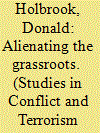

|
|
|
|
|
| Publication |
2013.
|
| Summary/Abstract |
This article explores the way in which the Al Qaeda leadership appeals to and addresses different cohorts of Sunni Muslim audiences through its statements. This communicative approach is understood in the context of collective action frames from the social movement literature. The article analyzes the way in which communiqués from Osama bin Laden and Ayman al-Zawahiri have approached different Muslim audiences, defining three principal approaches: encouragement, excommunication, and exasperation. The article discusses how these approaches developed from the early 1990s up until the end of 2011, arguing that denunciation of Muslim publics has become an ever more prominent feature of this discourse.
|
|
|
|
|
|
|
|
|
|
|
|
|
|
|
|
| 2 |
ID:
151000
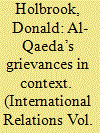

|
|
|
|
|
| Summary/Abstract |
At a time when political debate in the West is preoccupied with the perceived impact of extremist ideas on individuals who embrace or support terrorism, this article uses the publicly articulated grievances of Ayman al-Zawahiri, Al-Qaeda’s most prolific ideologue, as a case study to examine how a globally focused and distributed extremist narrative matches political realities on the ground. The approach of the article is to compare two political processes: the approach of Islamist extremists, as represented by Zawahiri, to constitutional reform as articulated through public appeals to potential supporters versus the reality of constitutional amendments and evolution of fundamental law in the Middle East and South Asia. Incorporating insights from studies on law and society and International Relations, the article demonstrates how Zawahiri’s interpretation of religious law emphasises wholesale adoption of sharia while the process of legal reform has invariably resulted in the creation of legal hybrids, mixing Islamic and non-Islamic legal traditions. This is not an article about theology or religious law but an effort to dissect the public relations of an international terrorist movement. The analysis pays particular attention to events in Zawahiri’s native Egypt, where evolving grievances concerning a series of constitutional amendments – including those following the Arab revolutions and the toppling of Mohammed Morsi – are assessed.
|
|
|
|
|
|
|
|
|
|
|
|
|
|
|
|
| 3 |
ID:
171664
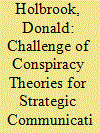

|
|
|
|
|
| Summary/Abstract |
Donald Holbrook highlights the role conspiracy theories play in relation to state and non-state strategic communications efforts that are hostile to Western security interests. Not only is their use and acceptance prevalent, but conspiracy theories also represent powerful rhetorical tools to justify indiscriminate or mass-scale aggression since they link shared grievances with alleged and purported networks of perpetrators, whose intent, secrecy, agency and connectedness are taken for granted.
|
|
|
|
|
|
|
|
|
|
|
|
|
|
|
|
| 4 |
ID:
169935
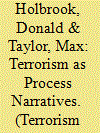

|
|
|
|
|
| Summary/Abstract |
Terrorism is a highly irregular form of crime where multiple factors combine to create circumstances that are unique to each case of involvement, or attempted involvement, in terrorist violence. Yet, there are commonalities in the way in which efforts to become involved unfold as processes, reflected as sequential developments where different forces combine to create conditions where individuals seek to plan acts of violence. The best way to frame this involvement is through analytical approaches that highlight these procedural dimensions but are equally sensitive to the nuances of each case. Analysing pre-arrest media usage of convicted terrorists, this paper focuses on the ways in which belief pathways and operational pathways interact in five distinct cases of terrorist involvement in the UK in what are termed “process narratives.”
|
|
|
|
|
|
|
|
|
|
|
|
|
|
|
|
| 5 |
ID:
178938


|
|
|
|
|
| Summary/Abstract |
This article studies media material which individuals who planned or carried out acts of terrorism in the United Kingdom between 2004 and 2017 collected before their involvement in these activities concluded. It explores the nature and type of content found, the “levels” of extremities that can be detected in these narratives as well as their source. It identifies repetitions in selection and differences in selection between lone actors and those who operated together in a group. Finally, it traces any temporal changes that emerged over the period under examination.
The article presents the subjects’ collection of ideological and facilitative media as reflections of the information environment which was available to them that helped to shape their perspective. It argues that subjects’ selections and choices from a much wider pool of available sources of information represent actions or behaviours that are observable. Moreover, it argues that studying these patterns and dynamics should form an essential part of our understanding of the way in which terrorism features and unfolds in different contexts.
|
|
|
|
|
|
|
|
|
|
|
|
|
|
|
|
| 6 |
ID:
120327
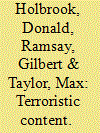

|
|
|
|
|
| Publication |
2013.
|
| Summary/Abstract |
In this article we offer a first attempt at providing a set of universal grading criteria for determining on what basis, and how far, an item of discursive content can be considered "terroristic." In doing so, we draw loosely on the existing COPINE scale for child abuse images. The scale described in the article is not intended to reflect actual risk of engagement in terrorist violence, nor is it intended to have evidential validity in relation to offenses in certain jurisdictions relating to "terrorist publications." Rather, by formalising assumptions which seem already to be latent in the literature on terrorist use of the Internet, it aspires to serve as a starting point for a more methodologically coherent approach to relationships between content-particularly online content-and terrorism.
|
|
|
|
|
|
|
|
|
|
|
|
|
|
|
|